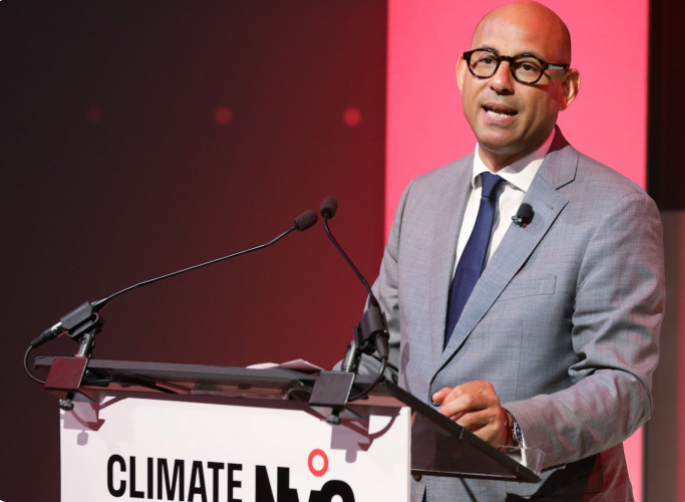UN Climate Speech
Keynote speech by UN Climate Change Executive Secretary Simon Stiell at the Opening of the New York Climate Week
Friends, colleagues,
This particular event is a moment of reflection for me, as it marks one year in my role as Executive Secretary of the UNFCCC.
In that spirit, I want to use this occasion to speak beyond the usual messages and provide some personal reflections from the 360-degree view of climate action I have been afforded over the last year.
The challenge of a “green transition” to a low-emission, climate-resilient world is immense, and it is urgent. But politically, it is a hugely difficult task.
Tensions have been building geopolitically over the last few years. The opportunity for polarisation is rife.
Developing countries’ often heavily indebted purse strings – pinched by competing crises – want to catch up, to provide a decent life for their entire population, climate action included.
This development has historically equated to significant fossil fuel emissions unless it is supported by currently insufficient levels of financial support.
Developed countries’ purse strings – pinched by geopolitics, the pandemic and economic stagnation, knowing how close we are to having used the world’s outstanding carbon budget – are interested in preserving their lifestyle.
Both want to see collective action to curb our charge towards the brink but differ on how to share the burden equitably and how we deliver a just transition.
This brings me to my first personal reflection:
Pre-Paris, we were focused on getting the agreement.
Post-Paris, we were focused on agreeing the rules.
It is only now, firmly in the era of transformation, where we are fully comprehending the truly gargantuan scale of finance necessary, all over the globe, to meet the commitments we collectively made to combat this climate crisis.
I cannot state clearly enough how significantly we will succeed or fail based on our ability to mobilise finance behind this endeavour.
This brings me to my second reflection:
Our levers for change are siloed from each other in incredibly unhelpful ways – including through the disparate processes that we contribute to.
If we want to see leadership from the world’s biggest economies, then sorry but the G20 and G7 are “predominantly economic forums”, with limited bandwidth or interest in finding compromises on climate.
If we need the international financial architecture to undertake a significant shift in its operating procedures, then sorry but those systems report to themselves and their other stakeholders.
If we want to synergise delivery on all national outcomes for development, prosperity and climate action, then once again sorry as that traditionally requires separate national plans, which require different consultants who don’t communicate with each other.
And to round off my series of thoughts on what’s not working, we have overrun ourselves with meetings, leaving minimal time in-between to do the crucial work of mobilising capitals to take the ambitious positions we need.
That is not to suggest that I don’t appreciate the number of actors wanting to engage in the climate space.
I am a stalwart supporter of inclusion – this year, in fact, the UNFCCC has accredited 600 more observer organisations to the COP.
As I said at COP27, I am focused on making the COP process more fit for purpose, one which better facilitates serious discussion between Parties and non-Party stakeholders.
For years, with varying levels of affection, we have collectively referred to the COP as a ‘circus’ – but this rhetoric must not take over: we need concrete climate action, not empty fanfare.
Which leads me to my reflections on ‘what’s working’.
Firstly, we are clear on where we need to go. We need 1.5 aligned commitments across the board. Yet there are only a handful who could claim they meet that across mitigation, adaptation, loss and damage and finance.
Secondly, we desperately need more transparency, to hold ourselves and each other to account on what has been committed.
Thankfully, that transparency is just about to arrive. With the advent of next year’s first biennial transparency reports, the enhanced transparency framework will be operational and we will see the full force of the Paris Agreement swing into action.
In addition to that, this year will be the first time that we make the list of participants at the COP and their affiliations public.
Thirdly, we have an opportunity between now and the COP to set ourselves up for the ambition we need for success in the UAE.
Which credible packages of support can come forward to demonstrate good faith?
Which sectors can come forward to demonstrate what is needed to course correct and get us on track with the Paris Agreement?
Which balance can be struck to make best use of the unique opportunity provided by the Global Stocktake, enabling accelerated implementation?
Finally, as guardians of the agreements, we at the Secretariat are stepping up to further support Parties – hearing all voices – to come together and achieve the commitments they made. As I hope all of you will also help us do.
More than ever, we need courage. We need leadership. We need stalwart COP presidencies that hunt for solutions and forge ambitious compromises. We need negotiators who take it on themselves to convince capitals of ambitious pathways.
We need political leaders that dare to see beyond their elected term and invest in our present and future, not to satisfy immediate populist impulses.
We need corporate leaders in the fossil fuel industry, in the financial sector and elsewhere who can challenge shareholders on destructive short-term gain, in favour of a longer-term vision of returns on investment for the planet.
Friends,
We can. We will. That is the attitude we need to bring to COP 28.
I look forward to reflecting on our collective successes as we move forward.
I thank you.

